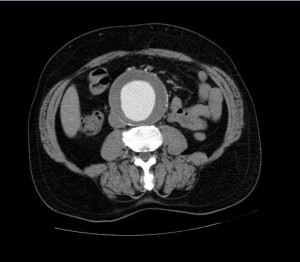That being said if you feel any this may apply to you please contact your healthcare provider.
Abdominal aortic aneurysm (AAA) is the term used to describe the swelling of the abdominal portion of the aorta. The aorta is a large artery that runs from the heart and supplies blood to the rest of the body. The majority of small aneurysms are not dangerous but if undetected a large aneurysm can be very serious.
Annette Olalobo, Aneurysm Screening Nurse at Leicester’s Hospitals, said: “If an undetected aneurysm expands, the artery becomes weak and may rupture. Most people won’t show any symptoms until the point of rupture, which can often be life-threatening, which shows how vital a simple screening can be.”
Vascular disease, including death from a ruptured AAA, accounts for 40% of UK deaths making it as common as cancer and heart disease. Chances of an AAA are also increased if you smoke, have high blood pressure or there is a family history.
That was the case for 68-year-old Brian Middleton . His father was diagnosed with an AAA, so when he was invited for his routine screening at 65, he had no hesitation in attending.
Brian explains: “During the screening, the team discovered I had an enlarged aorta. They recommended close monitoring so I had an appointment every six months, until last year, they decided it was time to operate.
“The whole team were very supportive from day one and discussed my options for surgery. I had a keyhole procedure last November. I spent four days in hospital, followed by a few weeks of rest but I can honestly say that I felt back to my normal self after about six weeks.”
Brian now visits the vascular team every six months, which will hopefully be reduced to once a year thereafter for monitoring.
He added: “My AAA didn’t cause me any pain or symptoms and without the screening I may not be here today so I have recommended it to all of my friends and family, some of which have already expressed an interest in coming along on Friday.”
Mr Matt Bown, Consultant Vascular Surgeon at Leicester’s Hospitals, explains: “Ultrasound scans are a simple but effective way of reducing AAA related deaths by detecting the disease before complications occur. It also gives us time to discuss management of the condition and treatment options with the patient at an early stage, just like we did with Mr Middleton.”
The AAA patient day programme will give patients who have been identified with an aneurysm, along with their carers’ and families, a chance to find out more about managing the condition, surgery and research into vascular disease.
Further details about AAA Screening can be found at www.leicestershospitals.nhs.uk/aboutus/departments-services/aaa-screening/
